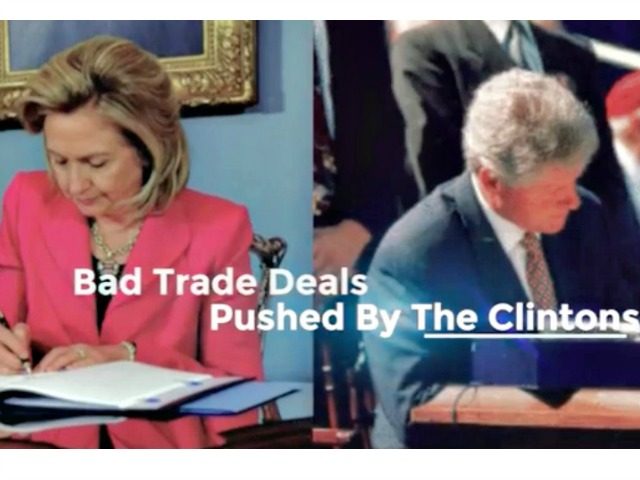The Trump campaign released a 30-second TV ad simply titled “Deals” on Tuesday, one day before the final presidential debate.
“Our economy once dominated the world. And our middle class thrived. Today, jobs are gone. Factories closed,” the ad says, blaming bad trade deals on the Clintons.
Trump will renegotiate the North American Free Trade Agreement (NAFTA) and cut taxes to make it easier to re-open manufacturing centers on U.S. soil, the ad says. Senior Policy Advisor Peter Navarro in a statement:
The Clintons have influenced every bad trade deal over the past 20+ years. From NAFTA to TPP to shipping our jobs offshore to China, this is the economic disaster of our time. It’s a politician-made disaster with the names of Hillary Clinton, Bill Clinton and Barack Obama all over it. We can’t afford any more of Hillary Clinton’s ‘leadership’ on this issue. Donald Trump on the other hand has a plan to cut taxes, reduce regulations, crack down on the trade cheaters, and renegotiate every bad Clinton trade deal in order to put American workers first.
Republican president George H.W Bush first negotiated NAFTA and Democratic President Bill Clinton pushed for the passage of NATFA in 1993 with a Democrat-controlled Congress, signing it into law in December 1993. “NAFTA is still controversial but people will thank me for it in 20 years,” Bill Clinton said last November. Critics have pointed out NAFTA stripped manufacturing out of the U.S. interior and encourages illegal immigration, particularly from Mexico. Both ruling class families are, of course, vehemently anti-Trump.
Economic Policy Institute researcher Robert E. Scott wrote:
Between 1993 (before NAFTA took effect) and 2013, the U.S. trade deficit with Mexico and Canada increased from $17.0 billion to $177.2 billion, displacing more than 850,000 U.S. jobs. Growing trade deficits and job displacement, especially between the United States and Mexico, were the result of a surge in outsourcing of production by U.S. and other foreign investors. The rise in outsourcing was fueled, in turn, by a surge in foreign direct investment (FDI) into Mexico, which increased by more than 150 percent in the post-NAFTA period.
Clinton will talk in glowing terms about NAFTA when writing memoirs but criticize it when she runs for office in order to placate progressive labor allies. NPR put together a timeline of Clinton’s ever-shifting political position on NAFTA and trade, writing at the time the former first lady has “difficulty maintaining a consistent position on international trade.”

COMMENTS
Please let us know if you're having issues with commenting.